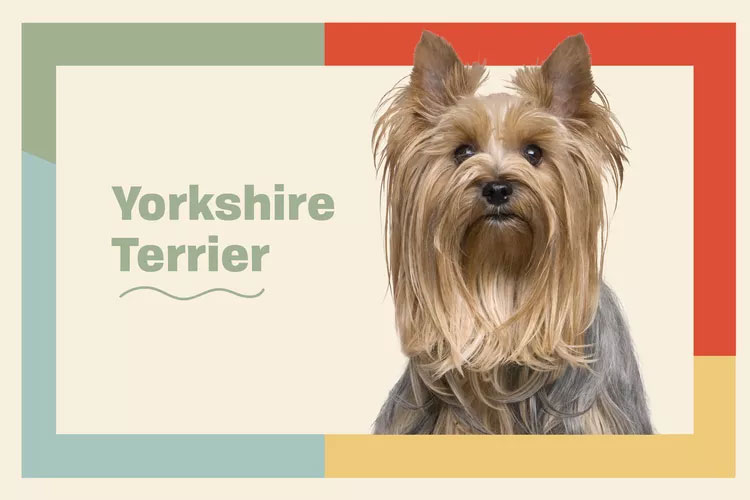
Yorkshire Terrier Overview
| OFFICIAL NAME | Yorkshire Terrier |
| COMMON NAME | Yorkie |
| PET HEIGHT | 7 to 8 inches |
| PET WEIGHT | 7 to 7 pounds |
| LIFESPAN | 11 to 15 years |
| GOOD WITH | cats, dogs, families, seniors |
| TEMPERAMENT | anxious, friendly, outgoing, playful, willful |
| INTELLIGENCE | high |
| SHEDDING AMOUNT | normal |
| EXERCISE NEEDS | medium |
| ENERGY LEVEL | active |
| VOCAL LEVEL | frequent |
| DROOL AMOUNT | low |
| BREED GROUP | toy |
| BREED SIZE | small (0-25 lbs.) |
| COAT LENGTH | long |
| COLORS | black, blue, gold / yellow |
| PATTERNS | black and tan, blue and tan |
| OTHER TRAITS | apartment-friendly, easy to train, high prey drive, hypoallergenic, requires lots of grooming, strong loyalty tendencies |
The Yorkshire terrier, or Yorkie, is a spunky, smart, small dog that is up for anything. Yorkies are the smallest of the terrier group, never getting larger than 7 pounds, but you wouldn't know it from their personalities. These feisty, fearless "tomboy" dogs were bred as ratters—meaning they were used for hunting rats—in northern England, and they've stuck true to their working-class roots. Yorkies are loyal and will take on any challenge in a New York minute.
These pups have big personalities and the brains to match. A dedicated owner can train and socialize these little divas into delightful companions. Their indomitable spirit makes them great little watch dogs and amusing pals to keep you company.
Yorkies (especially those tiny little puppies!) are also incredibly adorable, which doesn't hurt their popularity either—they're often counted as one of the top 10 most popular dog breeds. Their silky smooth hair can grow to floor-length, but many people choose to keep their Yorkie's coat in a shorter "puppy cut." Their coloring typically consists of beautiful steel blue or black with gold accents, giving them a regal look.
Looking for a hypoallergenic dog? Yorkies might be a better fit for allergy sufferers, but it's important to note that no dog is 100 percent hypoallergenic.
These adorable, pocket-size pups don't come without a cost. Leslie Stolfi, president of the Yorkshire Terrier Club of America (YTCA), says you can expect to shell out anywhere from $1,200 to $2,000 for a purebred Yorkie (depending on variables like location and pedigree). But if you're looking for a petite pal with a big personality, these little dogs might be right for you.
Appearance
Yorkshire terriers are proud little dogs, and they aren't afraid to show it. They might only weigh 7 pounds, but they carry an attitude big enough for a Great Dane. Even with all that sass, Yorkies are compact and ready for action—making the perfect "purse dog" who's tiny enough to take anywhere.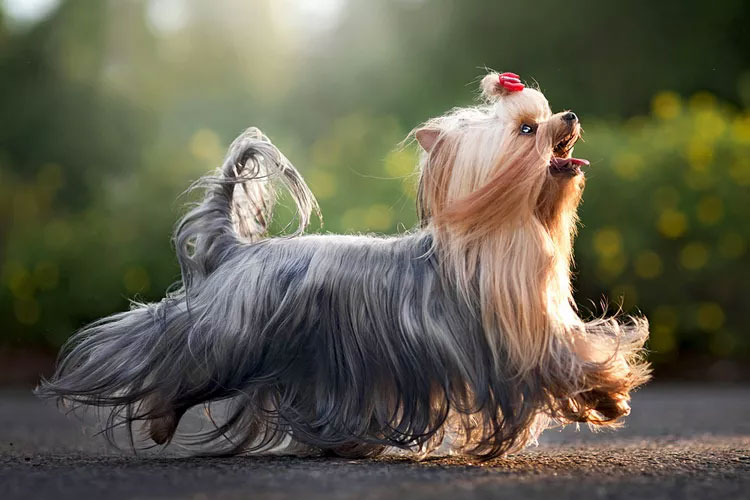
Yorkies can sport two distinctive looks: With their silky hair grown out to the ground, or with their coats trimmed shorter in a puppy cut. Either way their hair flows, they love to strut their stuff. They're cute and they know it.
The YTCA lists Yorkie standard color combinations as black and tan, black and gold, blue and tan, and blue and gold. They'll require regular grooming with daily brushing to keep their coats from tangling, and they may need more attention from a professional groomer in order to keep their tresses flowing mat-free. Yorkies usually have dark eyes, but because eye color often corresponds with their coat, it's not unusual to see dogs with light brown or even hazel eyes.
Temperament
Yorkshire terriers are known for their sassy personalities but are also charming and affectionate with their people."In comparison with other small breeds, Yorkies are smart, clever, always aware of their surroundings, and curious," Stolfi says. "They are playful and ready to interact and take charge of their family."
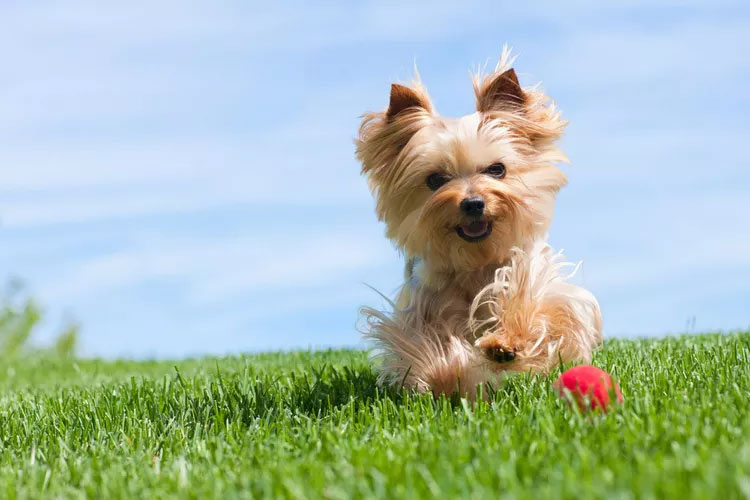
Though small in stature, Yorkies are true terriers at heart—meaning they'll need some boundaries to keep them from exhibiting less adorable qualities like excessive barking, separation anxiety, or suspicion toward strangers or other pets.
Because Yorkies were bred as ratters who hunted independently and needed that feisty attitude to do their work, they may not be the best fit for families with small children. Once kids are old enough to understand (and respect!) boundaries and the Yorkie's small size, these dogs can be a great family pet for families with older kids, and they make wonderful companions for seniors. They make good home alarm systems who will alert you whenever anyone comes knocking.
How to Help Your Kids Have a Healthy Relationship With Pets
A true companion animal, these little dogs want to go wherever you go. Yorkies need a moderate amount of exercise to be their happiest, healthiest selves: Two daily walks around 20–30 minutes each and some playtime with a toy (they adore the squeaky variety) are great ways to keep them from getting bored.
Living Needs
Smart and adaptable, Yorkies' small size makes them excellent apartment dogs, but they love going out on the town, too. It's their fearless, adventure-loving nature that helps them thrive in urban environments. They don't enjoy being left alone for long periods of time, and can be prone to separation anxiety that may require additional training. If your Yorkie exhibits signs of anxiety or stress when you're away, ask your veterinarian for advice or enlist the help of an animal behaviorist.Dealing With a Nervous Dog? Try This Unexpectedly Easy Kong Hack to Keep Them Occupied
While your Yorkie may enjoy going out with you to explore, they're mostly indoor dogs that don't tolerate extreme hot or cold weather well. When it's cold, you may want to consider a proper jacket to help keep her insulated from the weather. Avoid taking your Yorkie out in higher temperatures, too—and always be sure she has enough water to drink if you must bring her out on warmer days. Remember, dogs don't sweat like we do, and you should keep an eye out for signs of heat exhaustion.
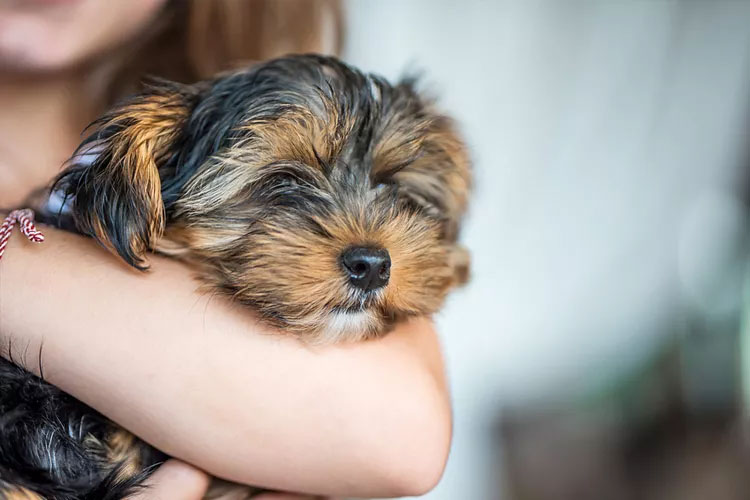
Stolfi points out that it's important to choose a dog that will fit your lifestyle. If you're looking for an active companion to train for the New York City marathon with you, a Yorkie probably isn't the right fit. Many Yorkies are just as happy snuggling in your lap for the afternoon, while some might prefer to hold court on the floor where they can feel in charge.
"In the case of rescues, I have found that Yorkies easily adapt to their new home," Stolfi says. "Because each dog has an individual personality, they adapt at different rates."
Yorkies prefer being the star of the show and can get jealous if another pet is brought into her home. However, if they're raised from puppyhood with other pets, they can get along fine with others. According to the Yorkie Information Center, properly socializing your dog with other people and pets will go a long way to keep her from getting too feisty around others.
Care
Intelligent companion dogs, Yorkshire terriers do best with basic training and obedience classes. Because Yorkies can be very independent, owners dedicated to making sure these little pups learn their manners will be grateful in the long haul.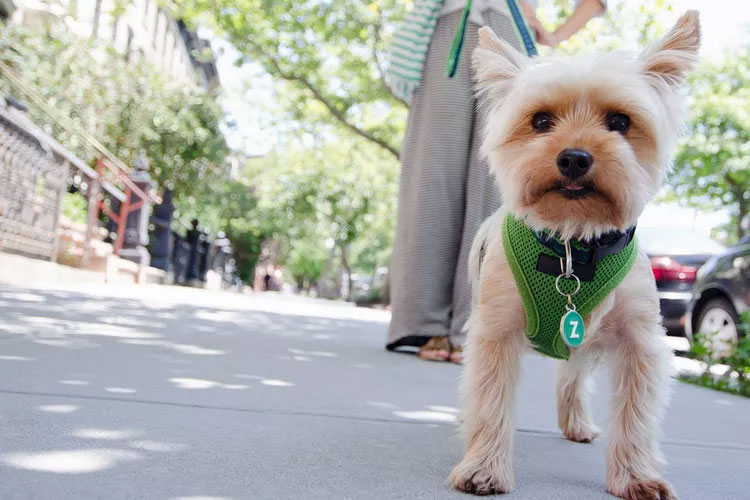
Like most dogs, Yorkies benefit from structure and positive reinforcement when it comes to training. Though they're small, you'll still want to teach basic commands to help give your pup confidence (and keep them from getting mischievous). With patience and some treats, these smart little dogs will have no problem understanding clear commands, and they can even learn cute tricks. Yorkies can sometimes be difficult to potty train, so ask your vet for tips about how to house train your puppy using the crate training method or with potty pads.
Because Yorkies have such long, silky hair, it's important to groom them regularly. The YTCA recommends daily brushing and a bath every couple of weeks. Some owners prefer to trim their Yorkie's hair into a shorter style to make handling easier. But either way you style your little pal, you'll likely want to have a groomer on speed dial to keep your Yorkie looking her best.
High-quality dog food is important to keep that lucious coat shiny and healthy, but beware of overfeeding: Yorkies are small and shouldn't put on excess weight. Ask your vet how much and how often you should feed them, which can vary by age.
Obesity in Dogs: Why a Paunch is Bad for Your Pooch
Health
Yorkies tend to be a healthy breed, and owners can expect their Yorkie to live 11–15 years, so long as they're kept healthy with good food, exercise, and regular vet visits. But like many small dogs, Yorkies can face certain health issues that owners should be aware of like collapsing tracheas, luxating patellas, hypothyroidism, and Legg-Calve-Perthese disease. Yorkshire terriers are also prone to a liver defect called portosystemic shunt that can be identified with a test.Small dogs can also have trouble with dental issues, and the Yorkie is no exception. Small mouths and overcrowding lead to tooth loss, decay, and even dental disease. Some Yorkies can lose up to half their teeth by age 12, so it's important to brush your Yorkie's teeth daily and have regular checkups and professional cleanings by your vet.
Smaller Yorkies, also known as "teacup Yorkies," are also prone to chronic health issues like low blood sugar, and may even have higher health risks overall. Ask your vet about any concerns you might have.
History
he Yorkie's rise from humble beginnings is as rough and tumble as they are. These mighty little dogs were initially bred in the northern England counties of Lancashire and Yorkshire. Scottish textile mill workers brought many types of Scottish terriers, including the extinct Clydesdale terrier, with them when they came over to England to work, according to the YTCA. They then bred these little Scots with extinct English terriers to create what is now known as the Yorkshire terrier.In the past, Yorkies were bred to be tough little rodent hunters, who were small enough to chase and root out vermin. It was a far cry from the glamorous apartment lives they live now, as the little ratters, as they were known, toiled away in textile mills and coal mines next to their blue-collar owners for years, according to the American Kennel Club.
Yorkshire terriers enjoyed a major life upgrade when Victorian women began adopting them as adorable lap dogs. Sprung from the dusty floors of factory life, these little pups were transformed into fashionable fur babies and never looked back.
Fun Facts
One of literature's most famous dogs might very well have been a Yorkie. Historians have pointed out that drawings from the first edition of L. Frank Baum's The Wonderful Wizard of Oz features Toto as a Yorkie, though the movie version was depicted by a Cairn terrier.The Yorkshire terrier became a famous hero during World War II, when an American soldier in a foxhole in Papua New Guinea found Smoky, who then went on to save lives by helping transport a communications cable through a small drainage culvert. She also visited soldiers in hospitals and went on to be known as the first therapy dog in history. Smoky's owner, U.S. Cpl. William A. Wynne, even wrote a book chronicling her many adventures called Yorkie Doodle Dandy, and there is a memorial dedicated to her honor in Cleveland.
Famous Yorkie owners include President Nixon's family, Audrey Hepburn, Kelly Clarkson, Mariah Carey, Missy Elliott, Kirsten Dunst, and Natalie Portman. Even curmudgeonly Simon Cowell can't deny the Yorkie's charms, so much so that he has three: Squiddly, Diddly, and Freddie.